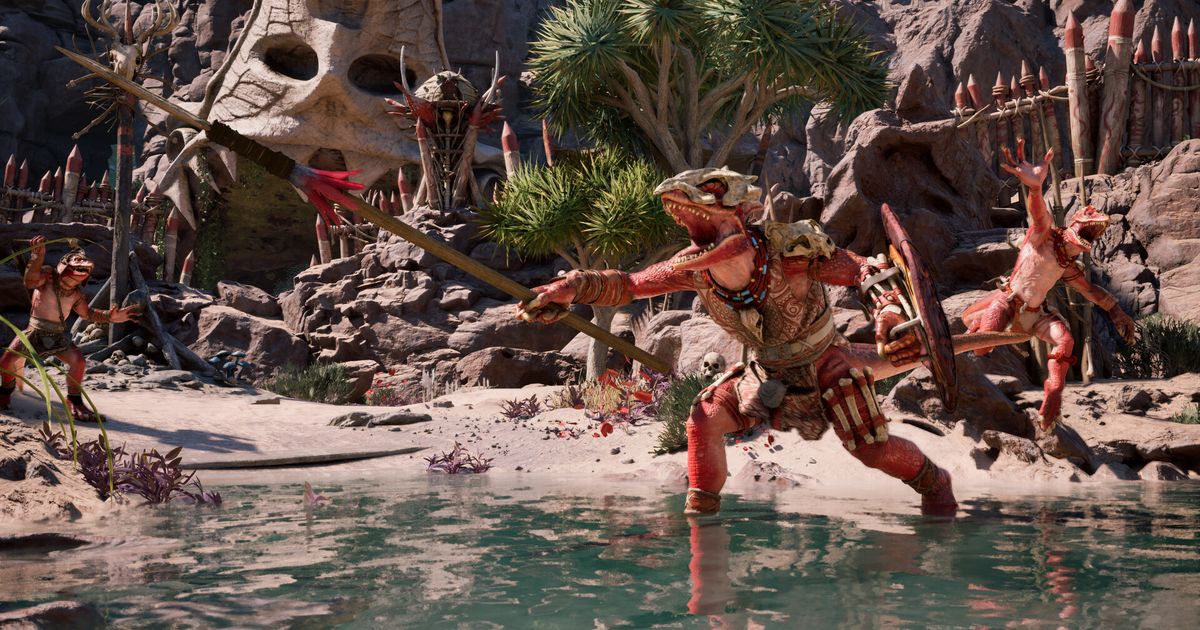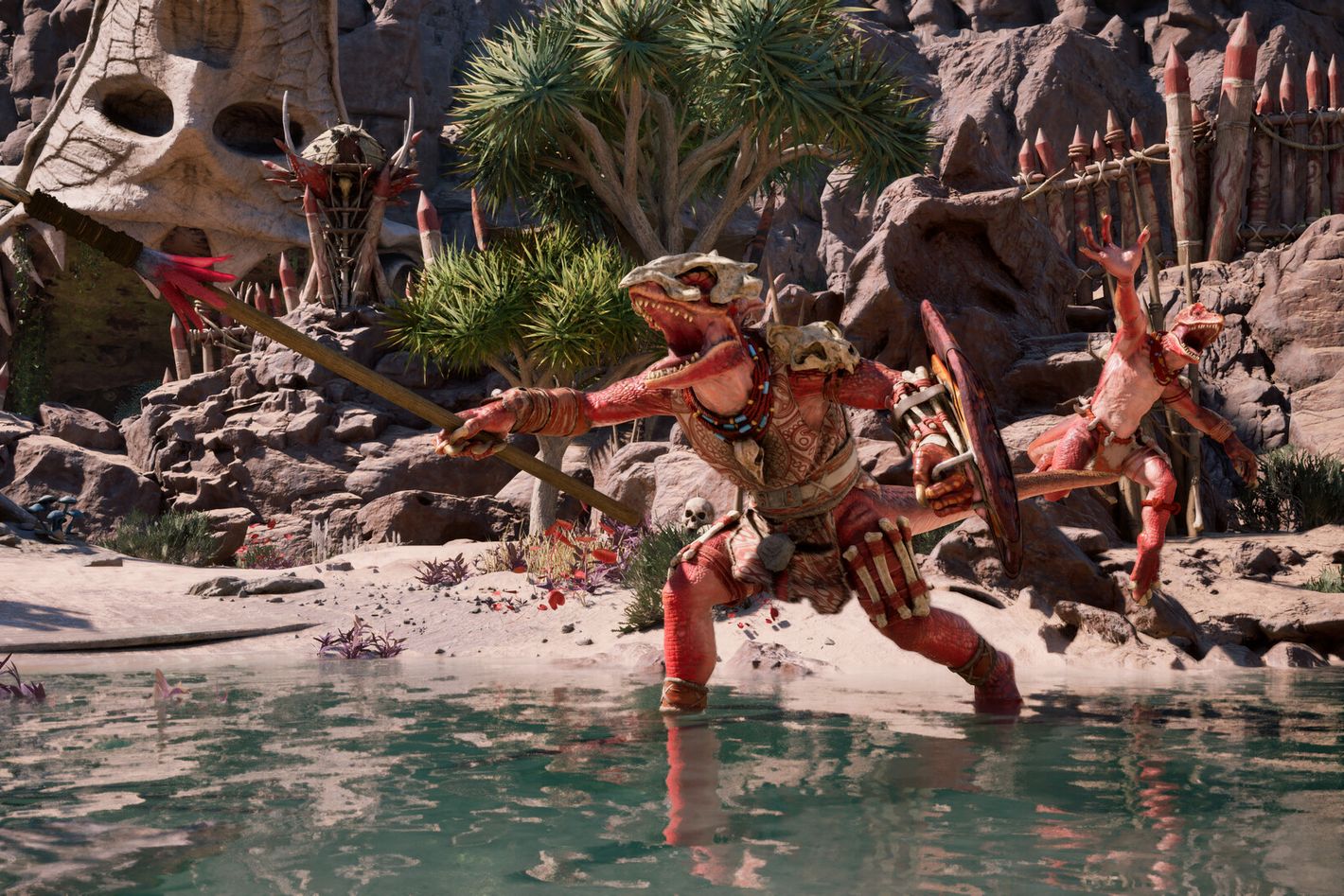Can Anyone Build a Better Skyrim?
New video game Avowed invites the comparison, but it’s — almost — more interesting than that.


The Elder Scrolls V: Skyrim arrived in 2011, and it remains, for better or worse, the last word for a certain kind of sprawling first-person, open-world fantasy game. But that was 14 years ago, and a follow-up is still likely years away. So why hasn’t anyone done Skyrim one better?
This is the cleanest pitch for Avowed, the new fantasy game from Obsidian Entertainment. Unfortunately, “Skyrim-like” is not the kind of game Avowed actually is. It’s more interesting than that. It’s also more disappointing than that. Alas, ambition cuts both ways.
Avowed has quite a lot going for it. For one, its premise is unusual, immediately distancing itself from standard fantasy tropes. You play as the emperor’s envoy to an island called the Living Lands with the mission of investigating a strange illness called the Dreamscourge, which is wreaking havoc on the local flora and fauna. The Living Lands feel reminiscent of Jeff VanderMeer’s Area X via swords-and-sorcery fantasy, setting up a story in which society and nature are in surreal conflict, and nature is poised to fight back.
This setup precedes a number of welcome inversions on typical fantasy fare designed to alienate the player character. Avowed constantly stresses that you’re a government lackey sent to an occupied territory, and everyone can’t stand you. It also casts you as a Godlike, which sounds good but mostly means you possess some kind of flora growing on your face that people are wary of. And then, shortly after your arrival in the Living Lands, some kind of supernatural entity tethers itself to you, one with the demeanor of a very powerful toddler, observing all your decisions and possibly learning from them — a delicious loaded gun to put on the table right at the start of the story.
Avowed’s developer, Obsidian Entertainment, has a long history in the genre and a track record of sharply written, witty, and compact games in one of the medium’s stodgiest genres. Over the last ten years, the studio has been building out its own roster of franchises after years of piecework, with which the studio proved itself as a capable steward of other studios’ output — perhaps most notably with Fallout: New Vegas, a sequel to Skyrim developer Bethesda Game Studios’ Fallout 3. These days, Obsidian endeavors to spin its own stories and worlds, although it’s still very easy to read its recent games as proprietary takes on IP the studio has experience with — its 2019 game The Outer Worlds, for example (which has a sequel due out this year), has a lot of Fallout in it.
This is why people may come to Avowed expecting Skyrim. Or at least, Skyrim by way of Obsidian: snappier, with a focus on story and memorable characters that even Skyrim’s most ardent fans would likely agree that game lacks. To some, this marriage might sound like the perfect game. In practice, it is mostly a confused one.
Every role-playing game is a fascinating push and pull between designer and player; the goal is to make the player feel as if they have some level of self-determination, when in fact they are always on track laid by the designer. Because human beings are fickle and unpredictable in a way that computer programs are not, letting player input affect a story is dangerous business. Avowed, then, suffers from the terrible irony of having a world that is too interesting. I have a million opinions on each dilemma the game presents me with, and yet most times I can only respond with three options: to embody the stodgy government lackey, to weakly concede that the locals may have a point, or to crack a joke. Companion characters, an element that can make or break role-playing games, fail to make much of an impression and, even as their individual struggles are introduced, feel overwhelmingly concerned with educating your character — who, again, is frustratingly narrow in their expression.
It does not take much time with Avowed to let go of the Skyrim comparisons, but here the game escapes the pressures of one box only to be hemmed in by another. Its involved, richly imagined setting more strongly evokes games like The Witcher 3 or Baldur’s Gate 3 (another game many in the genre will be burdened with by association for years to come). While much smaller in scope than these games, Avowed ironically feels most suited to a game that’s smaller still: one that really hones in on the demands and compromises of the player character’s job, or the uncanny strangeness of a land that decides to buck the laws of nature in a fit of rebellion, or a toddler god learning how to behave from your actions. I love all of these ideas on paper; Avowed just lacks the language to let me express my interest in-game.
One last note on Skyrim: It is fascinating how busted it is. The game always seems ready to implode at any moment, and that adds to its charm. Skyrim’s glitches, its quirks and limitations, are woven into the fabric of its popularity, adding to its memetic quality. This is one of the truly unique things about video games: how glitches and flaws in the code can become fundamental to the way we experience them. Similar errors in other media would be disastrous. In games, however, they are signs of humanity, a reminder that our imaginations will always outpace the machines we use to render them in detail. Maybe that’s the problem with Avowed. It fits too neatly in the hand, too mannered and disciplined to consider spilling over.
Related








